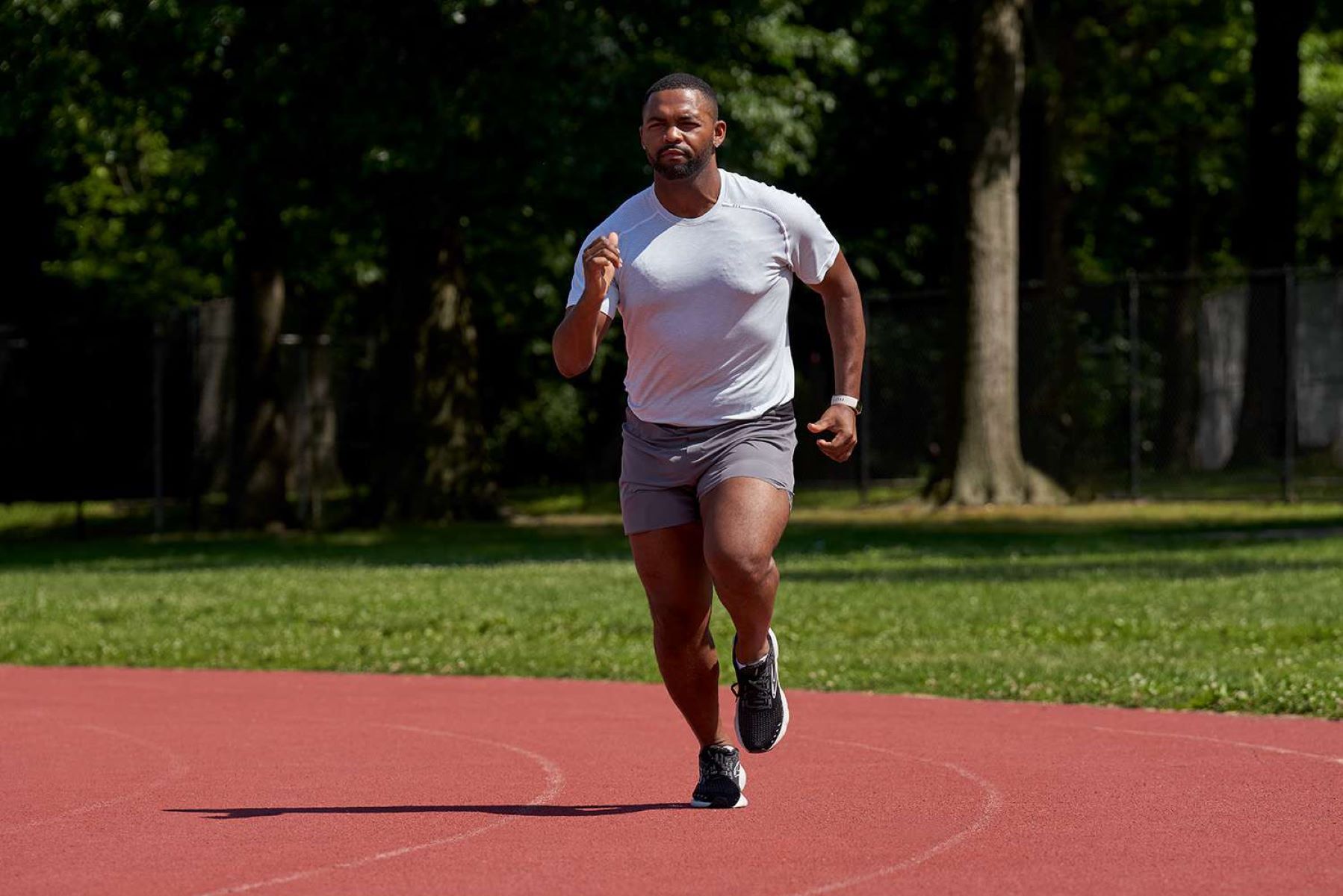Home>Misc>Featured>How Do Hormones Affect Athletic Performance


Featured
How Do Hormones Affect Athletic Performance
Modified: August 19, 2023
Discover how hormones can impact athletic performance and learn about the latest research findings in our featured article.
Introduction
Athletic performance is influenced by numerous factors, including genetics, training regimen, nutrition, and mental resilience. However, one often overlooked aspect that plays a significant role in how athletes perform is the impact of hormones on their bodies.
Hormones are powerful chemical messengers produced by various glands throughout the body. They regulate a wide range of bodily functions, including growth, metabolism, and reproduction. Hormones can have a profound effect on an athlete’s performance by influencing muscle growth, energy levels, endurance, and recovery.
In this article, we will delve into the fascinating world of hormones and explore how they affect athletic performance. We will examine the role of testosterone, estrogen, growth hormone, cortisol, thyroid hormones, insulin, and adrenaline in shaping an athlete’s abilities and achievements. By gaining a deeper understanding of the interplay between hormones and athletic performance, we can gain valuable insights into optimizing training strategies and maximizing potential.
It is important to note that hormone levels can vary greatly between individuals and are influenced by factors such as age, gender, and overall health. Additionally, the effects of hormones on athletic performance can also be influenced by genetic predispositions and individual responses to training.
Now, let us dive into the intricate world of hormones and their impact on athletic performance.
Understanding Hormones and Athletic Performance
Before delving into the specific hormones that affect athletic performance, it is important to have a basic understanding of how hormones function in the body and their role in regulating various physiological processes.
Hormones are chemical messengers produced by endocrine glands, which are specialized organs that secrete hormones directly into the bloodstream. These hormones then travel to target tissues and organs, where they bind to specific receptors and initiate a cascade of biological responses.
In the context of athletic performance, hormones play a vital role in regulating muscle growth, energy metabolism, oxygen delivery, and recovery processes. They can significantly influence an athlete’s strength, endurance, speed, and overall performance level.
One of the key factors in understanding the impact of hormones on athletic performance is the concept of hormone balance. Hormones work in a delicate equilibrium in the body, and disruptions in this balance can lead to various physiological issues that can impair performance.
For example, an imbalance in anabolic and catabolic hormones can affect muscle growth and recovery. Anabolic hormones, such as testosterone and growth hormone, promote muscle protein synthesis and tissue repair, while catabolic hormones, such as cortisol, break down muscle tissue and increase protein breakdown.
Another important aspect is the feedback loop between the endocrine system and the central nervous system. The hypothalamus, a small region in the brain, plays a crucial role in regulating hormone secretion. It receives input from various physiological signals, such as body temperature, blood sugar levels, and stress responses, and sends signals to the pituitary gland to release or inhibit specific hormones.
Understanding hormone regulation and feedback mechanisms is essential for athletes and coaches to optimize training, recovery, and overall performance. By recognizing the intricate relationship between hormones and athletic performance, athletes can make informed decisions about their training regimens, nutrition plans, and recovery strategies.
Now that we have established a foundation for understanding hormones and their role in athletic performance, let us explore the specific hormones that play a significant role in shaping an athlete’s abilities and achievements.
The Role of Testosterone in Athletic Performance
Testosterone, commonly known as the “male hormone,” is primarily produced in the testes in males and in smaller amounts in the adrenal glands of both males and females. It plays a pivotal role in athletic performance, particularly in promoting muscle growth, strength, and power.
One of the key physiological functions of testosterone is its anabolic effect on muscle tissue. Testosterone increases muscle protein synthesis, which leads to the growth and repair of muscle fibers. This, in turn, contributes to enhanced muscle mass, strength, and power.
Testosterone also has an impact on bone density. It helps stimulate the production of new bone cells and enhances bone mineralization, thereby improving skeletal strength and reducing the risk of fractures or stress injuries.
Furthermore, testosterone plays a vital role in regulating red blood cell production. Higher levels of testosterone can lead to an increase in the production of red blood cells, which improves oxygen-carrying capacity and enhances endurance performance.
It is important to note that testosterone levels in the body can be influenced by various factors, including genetics, age, sex, and training intensity. Certain exercises, such as resistance training and high-intensity interval training (HIIT), have been shown to acutely increase testosterone levels, leading to short-term performance benefits.
However, it is crucial to maintain a healthy balance of testosterone. Excessive or prolonged use of exogenous testosterone, such as anabolic steroids, can have detrimental effects on overall health and lead to various complications, including cardiovascular issues, liver damage, and hormonal imbalances.
It is worth mentioning that testosterone is not exclusively beneficial to male athletes. Females also produce testosterone, although in much lower amounts. It still plays a role in muscle growth, strength, and performance in women. However, excessive levels of testosterone in female athletes can have unwanted side effects and may result in disqualification from competitive sports due to regulations set forth by governing bodies.
Understanding the role of testosterone in athletic performance is crucial for athletes and coaches. While natural fluctuations in testosterone levels occur, maintaining overall hormonal balance through proper nutrition, rest, and training strategies is vital in optimizing athletic performance.
Now that we have explored the role of testosterone, let us investigate how estrogen, another important hormone, influences athletic performance.
The Influence of Estrogen on Athletic Performance
Estrogen, often referred to as the “female hormone,” plays a crucial role in the athletic performance of both men and women. While females naturally have higher levels of estrogen, males also produce small amounts of this hormone in their bodies.
Estrogen has several effects on the body that can impact athletic performance. One of its primary functions is to maintain bone health by promoting bone mineralization and reducing the risk of osteoporosis. Estrogen helps regulate the turnover of bone tissue, ensuring that bones remain strong and less prone to fractures or stress injuries.
In addition to its influence on bone health, estrogen impacts muscle function. It can promote the repair and regeneration of muscle tissue, leading to enhanced muscle strength and recovery. Moreover, estrogen aids in the delivery of nutrients to muscles, ensuring optimal fueling for endurance events.
Estrogen also plays a role in controlling body fat distribution. Women tend to have higher body fat percentages compared to men, which is influenced by estrogen levels. While excessive body fat can have negative implications for athletic performance, it is essential to note that a certain amount of body fat is necessary for hormone production and reproductive health.
It is worth noting that estrogen levels in female athletes can fluctuate throughout the menstrual cycle. During the follicular phase, which occurs before ovulation, estrogen levels are relatively low. However, they increase significantly in the luteal phase, which follows ovulation. These fluctuations can affect energy levels, endurance, and strength during training and competition.
Estrogen also interacts with other hormones, such as testosterone. It helps regulate the balance between anabolic and catabolic processes in the body. Estrogen can enhance the effects of testosterone, leading to improved muscle growth and performance. Conversely, imbalances in estrogen levels can disrupt this delicate equilibrium and potentially impact athletic performance.
It is important to note that hormone replacement therapy (HRT) and certain medications, such as oral contraceptives, can affect estrogen levels in the body. Female athletes considering such interventions should consult with medical professionals to understand the potential implications on their athletic performance.
Understanding the influence of estrogen on athletic performance requires a balanced approach. Maintaining estrogen levels within a healthy range, through appropriate training, nutrition, and lifestyle habits, can contribute to optimal performance for both male and female athletes.
Having explored the influence of estrogen, let us now turn our attention to the impact of growth hormone on athletic performance.
The Impact of Growth Hormone on Athletic Performance
Growth hormone (GH), also known as somatotropin, plays a crucial role in various physiological processes, including growth, metabolism, and body composition. It is produced and released by the pituitary gland, a small gland located at the base of the brain.
When it comes to athletic performance, growth hormone has several effects that can enhance an athlete’s abilities. One of its primary functions is stimulating the growth and repair of skeletal muscle tissue. Growth hormone promotes muscle protein synthesis, leading to increased muscle mass, strength, and power.
Beyond its impact on muscle growth, growth hormone also plays a role in the regulation of body fat. It promotes the breakdown of stored fats, known as lipolysis, for energy utilization. This can result in a reduction in body fat percentage and improved body composition, which is particularly important for athletes competing in weight-dependent sports.
Growth hormone also influences bone health by stimulating the production of bone cells and enhancing bone mineralization. It helps maintain bone density and strength, reducing the risk of fractures and stress injuries.
Another critical effect of growth hormone is its involvement in collagen synthesis. Collagen is the main structural protein in tendons and ligaments, providing strength and elasticity. By promoting collagen synthesis, growth hormone supports the integrity and health of connective tissues, reducing the risk of injuries and improving overall athletic performance.
In terms of energy metabolism, growth hormone stimulates the breakdown of glycogen (the stored form of glucose) in the liver, increasing blood glucose levels. This, in turn, provides readily available fuel for intense physical activity and enhances endurance performance.
It is important to note that growth hormone levels naturally decline with age. However, various factors, such as sleep quality, nutrition, exercise, and stress levels, can influence growth hormone secretion. For instance, intense resistance training and high-intensity interval training have been shown to acutely increase growth hormone levels in the body.
Although growth hormone has performance-enhancing effects, using synthetic growth hormone (such as in the form of doping) is strictly prohibited in sports due to its potential health risks and unfair advantage over other athletes.
Understanding the impact of growth hormone on athletic performance is valuable for athletes and coaches. While manipulating growth hormone levels naturally is challenging, strategies that optimize overall health, including proper sleep, nutrition, and training, can contribute to achieving optimal growth hormone secretion and maximizing athletic potential.
With an understanding of the impact of growth hormone, let us now explore the effects of cortisol, often referred to as the stress hormone, on athletic performance.
The Effects of Cortisol on Athletic Performance
Cortisol, often referred to as the “stress hormone,” is produced by the adrenal glands in response to various stressors, such as physical exertion, emotional stress, and lack of sleep. While cortisol plays important roles in the body’s stress response and daily physiological functions, it can also have significant effects on athletic performance.
One of the primary roles of cortisol is to mobilize energy reserves in stressful situations. It stimulates the breakdown of stored glycogen in the liver, converting it into glucose that can be used as a quick source of fuel during intense physical activity. This can enhance short-term performance and provide the energy needed for high-intensity efforts.
However, chronic elevation of cortisol levels can have negative implications for athletic performance. Prolonged or excessive stress can lead to increased cortisol secretion, which can have detrimental effects on muscle tissue. Cortisol stimulates muscle protein breakdown, inhibiting muscle growth and impairing recovery. This can result in muscle loss, decreased strength, and slower adaptation to training.
In addition to its effects on muscle tissue, cortisol can also affect inflammation and immune function. While acute inflammation is a natural response to exercise-induced stress and is crucial for tissue repair and adaptation, prolonged elevation of cortisol can lead to chronic inflammation. This can impair recovery and increase the risk of injury and illness, ultimately hindering athletic performance.
Cortisol also interacts with other hormones, such as testosterone, thereby influencing the balance between anabolic and catabolic processes in the body. Elevated cortisol levels can inhibit testosterone activity, hampering muscle growth and recovery. It is important to strike a balance between stress, cortisol levels, and recovery to maintain optimal hormone function and support athletic performance.
Managing cortisol levels is crucial for athletes to mitigate negative effects on performance. Strategies such as stress reduction techniques, adequate sleep, proper nutrition, and optimizing recovery can help maintain healthy cortisol levels and support overall well-being.
It is important to note that cortisol levels can vary throughout the day. They typically follow a diurnal pattern, with higher levels in the morning to help provide energy for the day’s activities and lower levels in the evening to facilitate relaxation and sleep.
Understanding the effects of cortisol on athletic performance can help athletes and coaches develop strategies to manage stress and optimize recovery. By maintaining a healthy balance between stress and relaxation, athletes can minimize the negative impact of cortisol and perform at their peak.
Now, let us delve into the role of thyroid hormones and their effect on athletic performance.
Thyroid Hormones and their Effect on Athletic Performance
The thyroid gland, located in the neck, produces and releases thyroid hormones, primarily thyroxine (T4) and triiodothyronine (T3). These hormones play a crucial role in regulating the body’s metabolism, growth, and development. They also have significant effects on athletic performance.
Thyroid hormones play a vital role in the regulation of energy production and utilization within cells. They influence the rate at which carbohydrates, fats, and proteins are metabolized to produce energy. As a result, optimal thyroid hormone levels are essential for maintaining energy levels and fueling athletic activities.
In terms of athletic performance, thyroid hormones can impact several physiological processes. They play a role in thermoregulation, helping to maintain a stable body temperature during exercise. This is particularly important for endurance athletes who engage in prolonged activities that generate heat.
Thyroid hormones also have an impact on cardiovascular function. They help regulate heart rate, blood pressure, and cardiac output. Proper thyroid function is crucial for maintaining adequate blood flow and oxygen delivery to working muscles, maximizing endurance and overall performance.
Muscle strength and power can also be influenced by thyroid hormones. Optimal thyroid hormone levels are associated with improvements in muscle contractility and neuromuscular function, which contribute to enhanced strength and power output.
Furthermore, thyroid hormones play a role in maintaining bone health. They support bone growth and mineralization, reducing the risk of bone fractures and stress injuries. Adequate thyroid hormone levels contribute to strong skeletal structure, providing a solid foundation for athletic performance.
Imbalances in thyroid hormone levels can have significant implications for athletic performance. Hypothyroidism, which is characterized by low thyroid function, can lead to fatigue, decreased energy levels, weight gain, and impaired metabolism. These symptoms can negatively impact an athlete’s ability to perform at their best.
On the other hand, hyperthyroidism, characterized by excessive thyroid hormone production, can lead to weight loss, increased metabolic rate, and muscle weakness. Athletes with hyperthyroidism may experience muscle wasting, reduced endurance, and increased susceptibility to injuries.
It is important for athletes to ensure proper thyroid function through regular check-ups and monitoring. If thyroid imbalances are suspected, medical professionals can provide appropriate interventions and treatment to restore hormone levels and optimize athletic performance.
Understanding the effects of thyroid hormones on athletic performance is crucial for athletes and coaches. By maintaining a healthy thyroid function through proper nutrition, rest, and medical guidance, athletes can support their metabolism, energy levels, and overall performance.
Now, let’s move on to the role of insulin in athletic performance.
Insulin and Athletic Performance
Insulin is a hormone produced by the pancreas that plays a crucial role in regulating blood sugar levels and facilitating the uptake and utilization of glucose by cells for energy. While insulin is primarily associated with its role in managing diabetes, it also has significant effects on athletic performance.
During exercise, insulin levels fluctuate based on the body’s energy needs. Intense physical activity leads to increased insulin sensitivity, allowing glucose to be quickly transported into muscle cells for fuel. This helps maintain adequate energy levels and supports performance during high-intensity efforts.
Insulin also influences muscle protein synthesis by enhancing the uptake of amino acids into muscle cells. This allows for faster recovery and muscle repair post-exercise, promoting muscle growth and adaptation to training.
Furthermore, insulin plays a role in glycogen synthesis, which is the storage form of glucose in muscles and the liver. Adequate glycogen stores are vital for maintaining endurance and preventing muscle fatigue during prolonged exercise. Insulin stimulates glycogen production, replenishing depleted stores and maintaining optimal energy levels.
It is important to note that individuals with diabetes or insulin resistance may have impaired insulin function, which can affect athletic performance. In such cases, careful management of blood sugar levels and appropriate medical guidance are necessary to ensure optimal performance and overall health.
While insulin is essential for energy metabolism, it is important to maintain a delicate balance. Excessive insulin secretion or artificial insulin use can lead to hypoglycemia (low blood sugar levels), which can cause dizziness, fatigue, and impaired performance. On the other hand, insufficient insulin secretion can result in hyperglycemia (high blood sugar levels), negatively affecting energy availability and overall performance.
To maintain proper insulin function, athletes can focus on consuming a well-balanced diet that includes carbohydrates, protein, and healthy fats. This helps regulate blood sugar levels and supports optimal insulin secretion and utilization. Timing meals and snacks strategically, especially around training sessions, can also aid in optimizing energy availability and performance.
Understanding the role of insulin in athletic performance is crucial for athletes and coaches. Maintaining proper insulin function through appropriate nutrition, monitoring blood sugar levels, and seeking medical guidance when necessary can help athletes maximize energy utilization, enhance recovery, and optimize performance.
Now, let us explore the role of adrenaline, also known as the “fight-or-flight” hormone, in athletic performance.
The Role of Adrenaline in Athletic Performance
Adrenaline, also known as epinephrine, is a hormone produced by the adrenal glands in response to stress or excitement. It plays a crucial role in the body’s “fight-or-flight” response and has significant effects on athletic performance.
During exercise, adrenaline is released into the bloodstream and acts as a powerful stimulant. It triggers a range of physiological responses that optimize the body’s ability to perform in challenging situations. Adrenaline increases heart rate, blood pressure, and cardiac output, delivering more oxygen and nutrients to working muscles.
One of the primary effects of adrenaline is an energy surge. It stimulates the breakdown of stored glycogen in the liver and muscles, increasing blood glucose levels. This provides a quick source of fuel for the body during intense physical activity, enhancing both strength and endurance performance.
Adrenaline also promotes vasodilation, expanding blood vessels in working muscles. This improves blood flow and oxygen delivery, allowing muscles to perform optimally and prolonging fatigue. Enhanced blood flow also aids in the removal of metabolic waste products from muscles, reducing muscle soreness and speeding up recovery.
In addition to its effects on fuel utilization and blood flow, adrenaline enhances mental focus and alertness. It increases arousal and concentration, improving reaction time and overall cognitive function during athletic performance. This heightened mental state can contribute to improved coordination, agility, and decision-making abilities.
It is important to note that the release of adrenaline is dependent on the intensity and duration of exercise. Short bursts of high-intensity exercise, such as sprints or explosive movements, typically elicit a more robust adrenaline response compared to moderate-intensity or prolonged endurance activities.
However, excessive adrenaline release can have detrimental effects on athletic performance. It can lead to feelings of anxiety, nervousness, or even decreased motor control. Athletes need to find a balance between harnessing the benefits of adrenaline and managing their response to minimize negative impacts on performance.
Controlling adrenaline levels during competition can be achieved through various strategies, including proper warm-up routines, relaxation techniques, visualization, and mental preparation. Athletes can also focus on developing a positive mindset and embracing the excitement and challenge of competition.
Understanding the role of adrenaline in athletic performance is crucial for athletes and coaches. By learning to harness the power of adrenaline and manage its effects, athletes can optimize their performance, overcome challenges, and reach their full potential.
Now that we have explored the role of adrenaline, let’s summarize the key points and conclude our discussion on how hormones affect athletic performance.
Conclusion
Hormones play a significant role in determining an athlete’s performance and overall success. Understanding the intricate relationship between hormones and athletic performance can provide valuable insights into optimizing training strategies, fueling the body, and maximizing potential.
Testosterone, as the primary male hormone, contributes to muscle growth, strength, and power. Estrogen, although more associated with females, also plays a vital role in muscle function and bone health. Growth hormone supports muscle growth, bone density, and collagen synthesis. Cortisol, the stress hormone, can have both positive and negative effects on muscle tissue and recovery. Thyroid hormones regulate metabolism, energy production, and cardiovascular function. Insulin influences energy utilization, glycogen synthesis, and muscle protein synthesis. Adrenaline enhances energy availability, blood flow, and mental focus for heightened performance.
It is important for athletes and coaches to recognize that maintaining a balance of hormones is essential for optimal performance. Fluctuations in hormone levels can occur naturally, but lifestyle factors such as nutrition, stress management, rest, and training can influence hormonal balance. Seeking medical guidance when necessary, especially for conditions like diabetes or thyroid imbalances, is crucial for maintaining hormone health.
Additionally, it is worth emphasizing that the use of synthetic hormones or performance-enhancing substances is strictly prohibited and can lead to severe health consequences and unfair advantages in competitive sports.
By understanding and working with the complexities of hormones, athletes can develop tailored training and nutrition strategies that support their unique physiological needs. Listening to their bodies, seeking professional advice, and making informed decisions can lead to improved athletic performance, enhanced recovery, and ultimately, greater achievements.
So, whether you’re a professional athlete, weekend warrior, or fitness enthusiast, harnessing the power of hormones can unlock your true athletic potential and help you reach new heights of performance.









